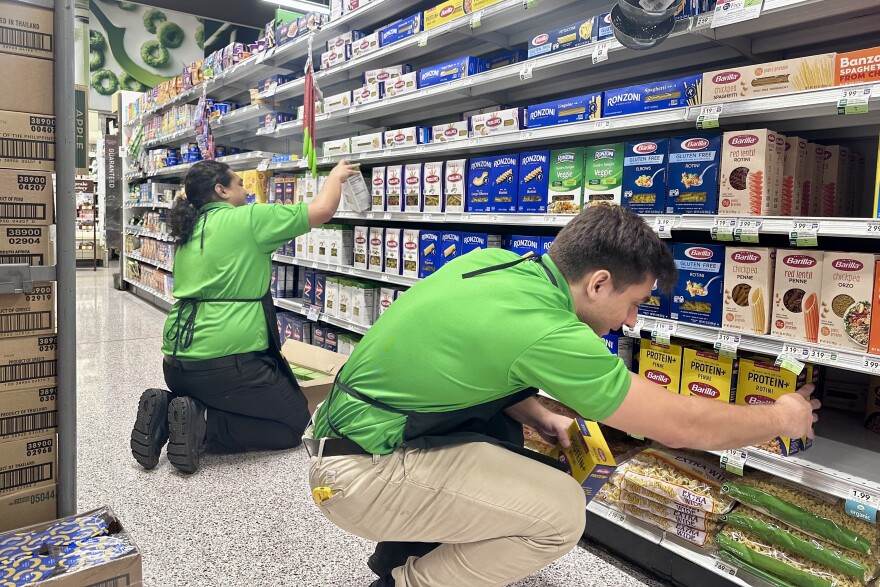Gainesville residents panic buying ahead of Hurricane Milton (original) (raw)
Published October 9, 2024 at 5:14 PM EDT
With powerful Hurricane Milton bearing down on Florida, Gainesville residents took no risks and stocked up on groceries, grabbing everything from bread to water and cookies.
Fraternity brothers Drew Averick, 21, and Spencer Whatley, 21, went snack shopping Wednesday morning to satisfy some sweet cravings. The two debated whether to get peanut butter-flavored Oreos or Nutter Butter cookies.
“Fear rules the world,” said Averick when asked why he thought consumers were panic buying.
“Everyone’s got to take a chill pill,” said Whatley. The two brothers said they were buying snacks for the hurricane and an upcoming bus ride to Nashville.
The most notably empty shelves used to store water, bread and toilet paper. And who could get through a possible crisis without chocolate? Shelves stocked with sweet treats like Oreos and chocolate bars were also popular, though not to the same degree as more essential items. Easy-to-fix and breakfast foods were also grabbed.

An Aldi grocery store closed early Tuesday in advance of Hurricane Milton’s arrival. Customers were greeted by this neon sheet of paper informing them of the store’s closure Tuesday and Wednesday. (Nicholas Mascilli/WUFT)
Consumers have been stocking up for hurricanes for decades. As far back as the Cuban Missile Crisis in October 1962, households loaded up with canned goods, fearing a direct military conflict with the Soviet Union.
One of the most memorable examples of panic-buying was during the COVID-19 pandemic when massive supply-chain failures made some goods hard to find. With Gainesville facing its second hurricane in just two weeks, it’s no surprise consumers are looking to stock up.
Audrey Lamar, 68, made her last shopping trip on Wednesday before the storm to stock up on snacks to host guests. Like many other customers, she found the recent toilet paper craze absurd.
“You can’t eat toilet paper,” she said while shopping with her great-granddaughter for snacks.
As shoppers continued their preparations in the early evening Tuesday, some stores, such as Whole Foods on Southwest Archer Road, closed early. Around 5:30 p.m., the store was emptied of meats and other perishables as employees prepared to close for two days.

Publix employees stock one of the most popular items on Wednesday morning. (Nicholas Mascilli/WUFT)
“Panic buying can have some pretty negative effects on the supply chain,” said John Lai, 37, an assistant professor at UF. “Especially when shoppers buy excessive quantities.”
Grocery store supply chains can be fragile. Lai said that stores operate using just-in-time inventory management strategies where stores order just what they need to provide for their customers and little more. This strategy ensures high-quality, fresh food, but it can cause short-term shortages when excessive amounts of certain items are rapidly purchased.
“Supply chains are limited by things like the amount of warehouse space, the number of trucks available to ship things out to stores, and even the workers or drivers of trucks who are available on hand to deliver those shipments of products,” Lai said. If businesses want to create a more resilient chain, they must make major investments in those different aspects of supply.
These factors make current resiliency in the supply chain an issue, especially when hurricanes push the chain to its limits.

Frat brothers Drew Averick (left) and Spencer Whatley (right) spent their final morning before the hurricane stocking up on snacks and drinks. (Nicholas Mascilli/WUFT)
“While the motivations to panic-buying are often induced by fear of supply-chain shortages, it’s still important that we all try to monitor our buying habits,” Lai said. He echoed local officials urging consumers to buy only enough items to last a week.
Limited consumption is the key to preventing issues caused by panic buying. When consumers limit their spending, their neighbors can count on getting what they need, too.
Zhenya Mishin, a student at Santa Fe College, said he agreed with the idea of limiting his consumption. While at Publix Tuesday night, he purchased dog food, fruit, water and bread to last him a week.
“I can survive,” he said. “It’s going to be enough.”